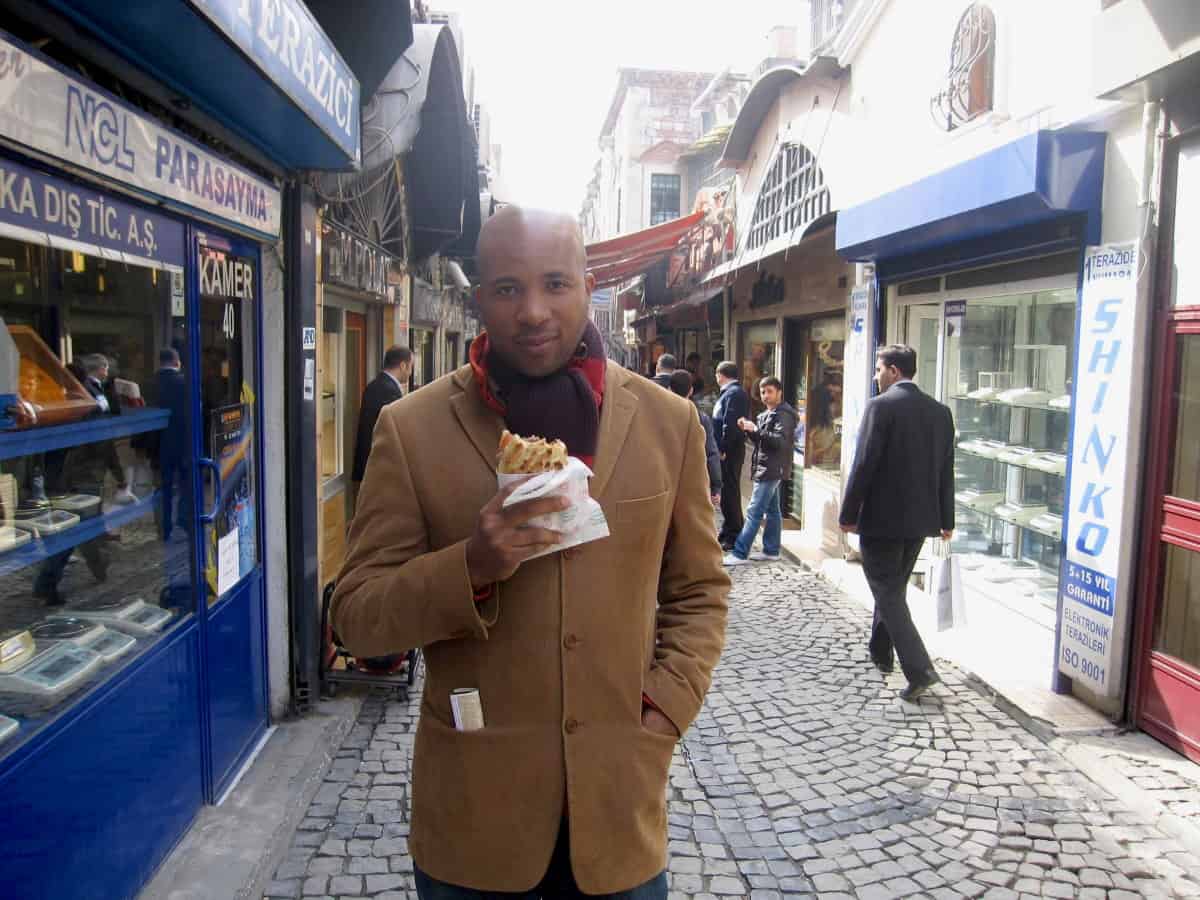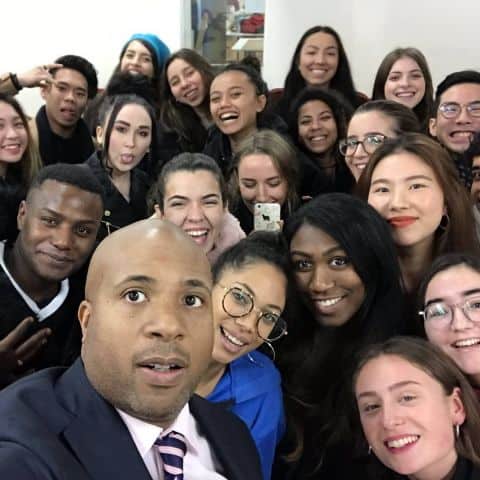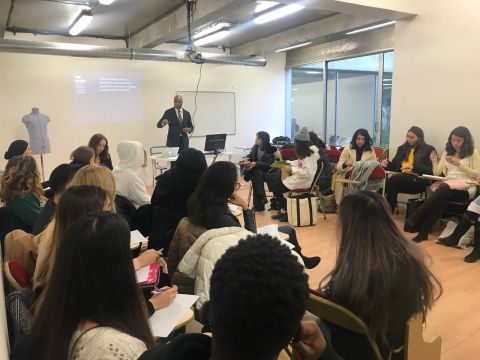
Dr. Derrick Gay, international expert on intercultural competency with over 20 years of experience, recently taught a seminar at IFA Paris that focused on diversity and intercultural competency. During his course, students explored issues related to global citizenship and intercultural skills. Below is a brief interview with Dr. Gay exploring his work and experience around the world.
IFA Paris: Dr. Gay, you travel the world to educate individuals to create a more equitable world. What led you to partner with IFA Paris?
Derrick Gay: I would say that it was fate that brought us together. In May 2018, I was consulting in France with La mission Laïque after having met the Executive Director in the United States during a visit with Les écoles françaises en Amérique du Nord. My work in France was to share best practices in diversity education from the United States and to articulate diversity and inclusion efforts in a global Francophone context, recognizing the role of French secularism in concepts around diversity.
Unbeknownst to me, Jean-Baptiste was also revamping the IFA Paris curriculum to integrate intercultural competency with the goal of preparing IFA Paris graduates for success in an already multicultural and globalized world. IFA had already begun integrating this work into the curriculum with Sissi Johnson, whom I knew through a mutual friend in the United States. Sissi introduced me to Jean-Baptiste, and the rest is history.
IFA Paris: Throughout their studies, our students learn alongside individuals from various different backgrounds. Did this cultural and social mix, which is rather familiar to them, enable you to address aspects other than those initially planned? How did you perceive your Parisian audience?

Dr. Derrick Gay selfie with IFA Paris students
Derrick Gay: Your question highlights one of the primary challenges of this work: distinguishing between diversity and inclusion. Diversity reflects this notion of a space that includes many individuals from different origins – religion, nationality, gender, age, abilities, language, socio-economic status, for example.
Inclusion, on the other hand, characterizes a sense of connectedness or belonging. The distinction is essential. We often confuse these two concepts, erroneously believing that creating a space in which different people interact will organically yield inclusion. For example, the mere fact that IFA Paris students hale from over 50 different countries, speak various languages, practice different religions and represent a number of other identity differences does not suggest that they will automatically foster an inclusive environment. Moreover, without intentionality to recognize differences and adopt strategies to mitigate prejudice, bias, and stereotypes, these diverse environments are more inclined to foster non-inclusive spaces, as individuals with similar characteristics tend to form groups by intentionally including each other.
The course that I designed for IFA Paris students introduced fundamental content of intercultural competence, a model composed of three primary components: self-awareness, awareness of others, and bridging strategies. During the module we examined the ways in which our environment informs our own and others’ beliefs, the stereotypes we have all learned, and specific strategies for becoming more inclusive. Specific thematic areas include identity formation, stereotypes, cultural appreciation vs. cultural appropriation, racism and sexism in the fashion world, and body image, to name but a few examples.
IFA Paris: Is pedagogical differentiation fundamental in today’s wold to achieving a global approach?
Derrick Gay: The use of culturally relevant pedagogy is essential in providing students the opportunity to learn more about themselves and others in meaningful ways. This pedagogical approach opens their minds, broadens their understanding of themselves and others, and modifies their behaviour and actions to foster an inclusive learning environment where all students can maximize their individual potential and cultivate a more equitable society.
A powerful metaphor that I use to capture this work is the idea that the curriculum should represent “mirrors and windows.” Students should see themselves in curriculum (mirrors) AND they should be able to see and connect with others who are different (windows). In the case of fashion, for example, if female beauty is defined only in narrow terms as a thin, blond, white/European woman with large blue eyes and a thin waist, this image is not a mirror for the majority of women around the world.
Extending the work that we began at IFA Paris regarding intercultural competency, it is essential that we begin to transform the fashion sector in ways that will resonate with and reflect the world in which we currently live. Unfortunately, this work is not yet part of the fashion school curriculum. Nor do many fashion companies participate in sustained professional development similar to that of other sectors. For example, I collaborate not only with schools, but also with professionals from the business world, law, music, and other sectors to provide continuing education in intercultural competency. Recognizing fashion is intrinsically cultural, the fashion industry must also engage in this critical work– especially when one considers the recent missteps of major high-profile brands.
IFA Paris: In the context of a well-intentioned group, which is the most effective awareness to develop: the knowledge of being or the knowledge of acting?
Derrick Gay: This question is essential to foster diverse and inclusive environments. In my work, I often find myself among individuals who view themselves as “good people,” so they instinctively believe, without much reflection or intention, that this identity will automatically create an inclusive environment. The logic is that one must intentionally think about hurting someone in order to hurt, which is certainly not the case. We all behave, both consciously and unconsciously, in ways that could potentially exclude others; therefore, simply being is insufficient. Longitudinal studies find that inclusion is always intentional; it requires action. The state of being may prove sufficient to maintain the status quo. And if you are part of what is considered “normal,” you will certainly benefit. As the understanding of what is considered “normal” becomes less and less aligned with demographic changes, we will need much more intentionality to create a truly equitable world.
IFA Paris: In the work environment, what mechanisms promote interactions across cultural differences, and how do these interactions positively impact a company’s performance?
Derrick Gay: Working environments composed of individuals from different backgrounds yield more productive and innovative and generative companies when compared to homogeneous working environments, when the working environment is inclusive, and individuals are able to leverage these differences. Research has also found that the most salient differences enhancing diversity thought and fuelling innovation are gender, race, and age. There are, however, caveats. Diversity must exist at all levels of a company—including at the highest organizational levels—in order to yield the many benefits of a diverse workplace. Further, the benefits from diversity are not sustainable without coupling this work with inclusion efforts.
IFA Paris: You are in the process of preparing a book and have recently begun producing a monthly newsletter. Why does information, combined with the fluidity of circulation, prove as an effective lever to fight against various forms of exclusion?
Derrick Gay: The genesis of the newsletter’s creation was informed by the numerous comments that I have received over the past 11 years from clients who told me that, while they greatly appreciated our workshops, courses, seminars, and collaborations, they would also appreciate the possibility of strengthening their individual capacities around intercultural competence. Through the current events and resources analysed in each newsletter, I seek to build on these insights and provide avenues for readers to continue to cultivate content knowledge, raise awareness, and learn strategies that help create inclusive environments. The book will serve as an extension of this purpose.

Dr. Derrick Gay lecturing at IFA Paris
IFA Paris: In your February newsletter, you highlight the danger of blackface. Despite their political, social, or ethical responsibility, several major brands (Gucci, Prada, and Moncler) have already been identified and accused of racism. Are these examples of repeated gaffes due solely to the lack of diversity within the strategic and operational teams of these companies?
Derrick Gay: Partly. If one examines the identities represented by the decision-makers of large fashion houses, one quickly realizes that the leaders are mostly white men of European descent. Without intentionally learning more about their own implicit biases and stereotypes and ensuring that their companies, products, decision-makers, leaders, advertisements, and policies better reflect the many identities reflected in our magnificent global tapestry, leaders will continue these “gaffes” and we will continue to see these unfortunate incidents, which are completely avoidable.
The other critical point to be made is that consumers must continue to hold fashion companies accountable. Let us not forget that groups labelled as “minorities” represent, in fact, a global majority. For example, I am certain that Prada would not want to lose China as a consumer, given the market share generated by that country.
IFA Paris: Fashion professionals demonstrate unlimited creativity but still seem unable to eliminate stereotypes from their work. Inclusion was THE guideline to follow during the last fashion week. Will we finally see the first steps of a long-awaited change?
Derrick Gay: In light of recent instances of insensitivity by major fashion houses, Fashion Week has no choice but to make a visible statement on the importance of diversity. Notwithstanding, I remain sceptical about the authenticity of these efforts and the intentions to sustain the work after the end of Fashion Week.
My IFA Paris MBA students astutely observed the problem with diversity during Fashion Week: the efforts highlight non-Europeans as somehow different from the norm, which once again places people in boxes. To become truly inclusive and reflect the many representations of beauty that the world offers, fashion must rethink its model and begin to reflect and represent everyone rather than continuing the current strategy of adding “differences” to the current status quo.
IFA Paris: You are trilingual and frequently reference the power of words. Your work refers to the importance of deconstructing language – the accuracy of use and meaning of each word. We have been using the term diversity since the beginning of the interview, but it is a word that you do not like. Why do you prefer the word inclusion? How can the term diversity have a negative connotation?
Derrick Gay: In fact, I speak five languages: English, Spanish, French, Italian, and Portuguese, with studies in German, Korean, and Latin. Language is indeed essential in shaping our understanding of ourselves, of others, and of the world. Often, after watching my TEDx Talk, some people believe that I advocate abolishing the word diversity. This is not the case at all; my concern is not with the word. The word, in fact, is neutral. Diversity means differences- not different. What concerns me is the ways in which the word has been appropriated to characterize the identities of groups that have been historically marginalized in society. In this sense, for example, women—who represent a majority—are considered as “diverse” or “minority” compared to men. Within the racial framework, Asians and blacks are also perceived as “diverse,” and those of white European origin are “normal” and, therefore, represent all of humanity.
My experience in this work on diversity and inclusion over the past 20 years has taught me that this definition of the diversity framework does not serve to unite us. We must conceive diversity as differences, recognizing that everyone has similarities and differences with others. The problem is that society does not recognize these differences in the same way. Diversity is an important concept because it allows us to reflect on the importance of representation: who is seen and who is not, what perspectives are affirmed and important, and what perspectives are absent from leadership and decision-making. Inclusion, distinct from diversity but nevertheless linked, emphasizes the intentional action of ensuring that these differences have an equitable experience of connection, belonging, and, in many cases, power.
For more information on Derrick:
Website: https://www.derrickgay.com
Instagram: https://www.instagram.com/derrick_gay
LinkedIn: https://www.linkedin.com/in/dr-derrick-gay-28362228
TED Talk: https://www.youtube.com/watch?v=qQ3iaf0omoY